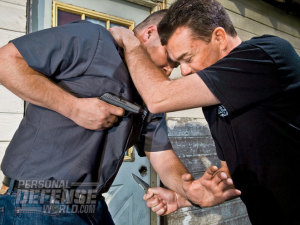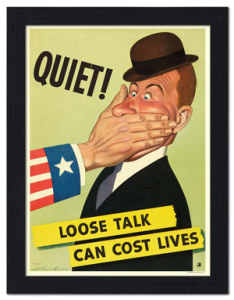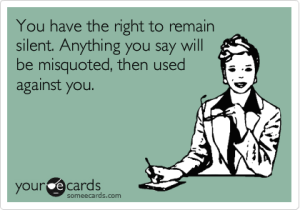JUSTIFIED: Does Pennsylvania Law Allow for Use of Force in Self-Defense?
This is a two part series with an in-depth look into armed self-defense by law abiding citizens.
Personal protection is generally accepted as the number one reason why Americans own guns. If you own a gun for personal protection, it follows that you are prepared and willing to use your firearm to defend your own life. What are the legal repercussions for using your firearm in self-defense?
What is self-defense?
The first thing you must understand is that self-defense is a justification defense. When claiming self-defense, you are saying that you definitely did it. It was not an accident. You did what you did intentionally and knowingly. However, you did what you did to defend yourself. It is the classic “You or Me” moment.
Under Pennsylvania law, conduct which is typically criminal will not be deemed illegal, if the conduct is justified. In the context of firearms, justification generally comes into the picture in self-defense situations. Pennsylvania courts have long recognized the use of force in self-defense, including deadly force: “a killing committed to protect one’s life or limb, or to save one’s self from great bodily harm, or under circumstances reasonably giving rise to fear of such injuries unless one kills his assailant is justifiable.” Commonwealth v. Capalla, 322 Pa. 200 (1936).
Justification has since been codified as an affirmative defense in Title 18. An affirmative defense means that you as the accused, through your attorney, have to claim it. Once you do so, in Pennsylvania, then it becomes the government’s burden to overcome your claim of self-defense with evidence beyond a reasonable doubt.
As justification is an affirmative defense, let’s talk about how raising an affirmative defense works procedurally. In order for a defendant to be convicted of a crime, the prosecutor must prove every single element of the crime beyond a reasonable doubt. “Beyond a reasonable doubt” is a very high standard to meet, because the finder of fact (usually, a jury) must find that no reasonable person could draw any other conclusion as to each element of the crime. Even if this standard is satisfied, the accused may raise an affirmative defense. Still, the accused does not have the burden to prove a self-defense claim. Commonwealth v. Smith, 2014 PA Super 165 citing Commonwealth v. Torres, 564 Pa. 219, 224 (2001). Rather, there must simply be “some evidence, from whatever source to justify a finding of self-defense.” Id. If raised properly, the prosecutor will then have the burden to prove beyond a reasonable doubt that the defendant’s actions were still not justifiable under the laws of self-defense.
With an affirmative defense, “the defendant admits his commission of the act charged, but seeks to justify or excuse it.” Commonwealth v. White, 342 Pa. Super. 1, 7 (1985) quoting Commonwealth v. Rose, 457 Pa. 380, 387 (1974). In other words, the defendant says “Yes, I did it. But there’s this lawful reason why I did it.” Pennsylvania law provides many instances in which use of deadly force is specifically justified.
For example, in Pennsylvania, criminal homicide constitutes First Degree Murder when it is the result of an intentional killing. Using an affirmative defense is not claiming “I did not intentionally kill anybody.” Rather, the defendant claims “I did in fact intentionally kill somebody. However, I did so because of a legally recognized justification.”
In a recent Michigan case, Theodore Wafer was sentenced to a minimum of 17 years in prison for fatally shooting Renisha McBride through his screen door. At the outset, Mr. Wafer claimed that he had shot Ms. McBride accidentally. However, Mr. Wafer went on to raise a self-defense claim at trial. While Michigan’s substantive law of self-defense is different than that of Pennsylvania, the procedural concept of self-defense is universal. Accordingly, “It was an accident” and “I did it on purpose, but there is a legally recognized justification” don’t exactly blend together well.
When can someone use self-defense?
The Pennsylvania self-defense statute provides that use of force is “justifiable when the actor believes that such force is immediately necessary for the purpose of protecting himself against the use of unlawful force by such other person on the present occasion.” 18 Pa.C.S. § 505.
Importantly for Penn LAGOs, the statute further authorizes the use of deadly force when “the actor believes that such force is necessary to protect himself against:
- death,
- serious bodily injury,
- kidnapping or
- sexual intercourse compelled by force or threat.”
Generally, you cannot use deadly force if you can avoid the threat completely safely by retreating. However, the duty to retreat is eliminated in certain scenarios as provided by statute (ex: Castle Doctrine and Stand Your Ground, which we will discuss in depth in a our very next post).
Modern Myths Debunked
When you can legally use deadly force in self-defense, you are not legally obligated to:
- provide a verbal warning before shooting,
- use warning shots before shooting to end the threat,
- provide a chance for perpetrator to surrender,
- call 911 before using deadly force,
- call 911 after using deadly force,
- announce to the perpetrator that you have a gun,
- shoot to wound before using deadly force, or
- provide a statement to the police or anyone after you use self-defense (In fact, all competent criminal defense lawyers will tell you not to make any statement to police or anyone at all. “Lawyer Up and Shut Up” is the best option.)
Any use of a firearm will be considered deadly force in the eyes of the law. To clear up a common misconception, using lower caliber firearms, warning shots, and aiming at non-vital areas can still be considered deadly force. That’s right, firing your .22 at an attacker’s feet can be considered deadly force, which may sound odd to those familiar with firearms.
Other common misconceptions when calculating deadly force include:
- What caliber you use matters. [Point of fact it does not. The law does not require you use the lowest caliber firearm available to you in a given situation]
- The type of firearm used matters. [Point of fact it does not. The law does not require you use a handgun over a shotgun over a FNH SCAR 17s or your Barrett Model 82A1 battle rifle.]
- The number of shots used matters. The moment you reload your weapon, you can no longer claim self-defense. [Point of fact it does not. The law does not require you use only one projectile. As anyone who has had any tactical or self-defense training will tell you, you shoot to end the threat. The fact is even those who are highly trained and drilled will require more than one shot to end the threat. Shooting to end the threat does not mean murder, it means shooting to stop the perpetrator from continuing to complete one of the four specified acts allowed under Pennsylvania law, meaning death, serious bodily injury, kidnapping or sexual intercourse compelled by force or threat.]
- The modifications to the firearm used matter. [Point of fact they does not. It makes no difference if you use your match grade Geissele or Timney trigger or your Glockworks modification. If you or some gunsmith modifies a trigger to make it a “hair trigger,” it doesn’t make self-defense any more or less available.]
- The type of load used in the gun matters. [Point of fact it does not. Whether you use Full Metal Jacketed ammo, hollow points, frangible ammo, Hornady Critical Defense® ammunition, Speer® Gold Dot® ammunition, 00 buckshot, slugs, high grain rifle rounds or hand-loads does not factor into the legal equation.]
- Whether you have a concealed carry permit matters. [Point of fact it does not. A Pennsylvania License to Carry a Firearm does not eliminate your ability to claim self-defense or mean that you have any “extra” rights to defend yourself.]
- It matters if you have received advanced tactical training or have military SF or operator training. [Point of fact it does not. Even if you are a Brazilian Jiu Jitsu black belt and teach combat tactics in the Reserves, whether deadly force is permissible depends upon the circumstances at the time you encounter your situation. You are still held to the same standard as the rest of us.]
As a general proposition, self-defense must be necessary and proportional. For instance, if somebody threatens to slap you, you can’t hit them over the head with a baseball bat in self-defense. Pennsylvania’s justification statute also uses the words “immediately necessary,” so the harm must be imminent. When is harm imminent? Basically, harm is imminent when it is “about to” happen.
It has to be reasonable under the circumstances. What is reasonable under the circumstances is highly fact- dependent. This is where it makes a big difference who your defense attorney is. You need to have a very well-experienced criminal defense attorney who actually possesses, respects and uses firearms. You’d be shocked how many criminal defense attorneys have never held a firearm, yet will accept firearm-related cases to defend them. The DA’s office and the Court will consider the totality of the circumstances in determining whether the actor reasonably believed the use of force was necessary. These determinations are incredibly fact-dependent and must be decided on a case by case basis. There are infinite factors which can have an impact on this determination.
To help illustrate this concept of self-defense, we’d like to introduce you to PennLAGO’s very own hypothetical characters, “Chris the Criminal” and “Larry the Law Abiding Gun Owner.”
Scenario 1:
Chris tells Larry “I’m going to shoot you FIRST THING TOMORROW!” Can Larry deploy lethal self-defense now to defend himself immediately after those words?
- Do Chris’s words place Larry in fear of death, serious bodily injury, kidnapping or sexual intercourse compelled by force or threat? YES.
- Is it an imminent threat? NO.
So no, Larry cannot legally deploy lethal self-defense now to defend himself right now after those words. What should Larry do? Monitor Chris. Get safely away from Chris. Consider making a police report. Be prepared.
Scenario 2:
Chris is in a parking lot outside of his truck and comes across Larry. Chris confronts Larry. Chris threatens to go back into his truck, get his gun in the glove box, and shoot Larry when he gets back. Can Larry deploy lethal self-defense now to defend himself immediately after those words?
- Do Chris’s words place Larry in fear of death, serious bodily injury, kidnapping or sexual intercourse compelled by force or threat? YES.
- Is it an imminent threat? NO.
So no, Larry cannot legally deploy lethal self-defense now to defend himself right now after those words. What should Larry do? Monitor Chris. Get safely away from Chris. Consider making a police report. Be prepared.
Scenario 3:
Chris has a pistol on his hip, open carry style. Chris has his arms folded across his chest. Chris says to Larry “I’ve got a gun and I’m going to shoot you!” Can Larry deploy lethal self-defense now to defend himself immediately after those words?
- Do Chris’s words place Larry in fear of death, serious bodily injury, kidnapping or sexual intercourse compelled by force or threat? YES.
- Is it an imminent threat? NO.
So no, Larry cannot legally deploy lethal self-defense now to defend himself right now after those words. What should Larry do? Monitor Chris. Get safely away from Chris. Consider making a police report. Be prepared.
Scenario 4:
Same facts as Scenario 3, but after the words, Chris makes a movement to his hip towards his gun and starts to engage his gun towards Larry. Can Larry deploy lethal self-defense now to defend himself?
- Do Chris’s words place Larry in fear of death, serious bodily injury, kidnapping or sexual intercourse compelled by force or threat? YES.
- Is it an imminent threat? YES. It is reasonable to believe that Chris intends to imminently (is “about to”) shoot and cause death or serious bodily injury to Larry.
Scenario 5:
Chris mistakenly believes that Larry insulted him. Chris comes up to Larry and punches him in the gut knocking Larry’s wind-out. Chris walks away from Larry. Can Larry deploy lethal self-defense now to defend himself right now, after this happened?
- Do Chris’s words or actions place Larry in fear of death, serious bodily injury, kidnapping or sexual intercourse compelled by force or threat? NO.
- Is it an imminent threat? NO.
So no, Larry cannot legally deploy lethal self-defense now. What should Larry do? Monitor Chris. Get safely away from Chris. Consider making a police report. Be prepared.
As you can see just with our 5 scenarios, there are just so many factors that come into play.
For instance, if Chris is 6’5″ and 255 pounds of muscle and Larry is 82 years old and very obviously frail, it might effect the calculus. What about being surrounded by a crowd of people who you believe that might mob attack you and send you to the hospital or the morgue? It all depends.
Can an accident ever be a lawful act of self-defense?
 Legal principles aside, it may be possible for one to intentionally kill somebody in self-defense, but still consider the entire ordeal an “accident.” Suppose there is a hypothetical young man in the neighborhood named Nicky the Knucklehead. Nicky is a big guy, about 6’6”, and a fit 300 pounds. Although Nicky has been in trouble from time to time, he’s not really a violent guy. One night in November, Nicky gets extremely intoxicated. In his intoxicated state, he believes that it is Halloween night, even though it is not. In fear of missing out on the fun, Nicky dresses up like a burglar to go trick or treating. He’s wearing all black and a ski mask, complete with a toy gun which looks very real. He decides that he will burst through people’s front doors and scream “Give me all your candy!” holding up the toy gun in jest. He whole-heartedly believes that everybody will appreciate his costume and Halloween spirit. Larry is new to the neighborhood and has never met Nicky. Even if he had, he probably wouldn’t recognize him in the elaborate costume Nicky has prepared. Nicky bursts through Larry’s front door as Larry sits on his couch, handgun on the coffee table. Nicky raises the toy gun, and in his slurred, intoxicated voice shouts “Give me all your . . . ” but before he can finish, Larry shoots Nicky. After Nicky is on the ground, Larry approaches to secure Nicky’s weapon away from him. Larry picks up the weapon and to his horror finds out that it is a highly realistic looking plastic gun. Before the police arrive, Nicky’s roommate hears the shots and comes over. He sees Nicky and explains to Larry that Nicky wasn’t really a bad guy and didn’t mean to hurt him. Now knowing all of this, when the police arrive, Larry in shock tells the law enforcement officers: “It was an accident, I didn’t mean to do this.” Larry after all is an honest person, and he’s telling the truth. However, in reality, Larry did mean to do it, and under the circumstances he had a legal justification to do it. Remember, self-defense and lethal self-defense are judged not based upon perfect hindsight, but rather under the circumstances known at the time. However, calling it an accident, and saying he didn’t mean it might erode his justification defense. While the outcome was tragic, and he probably wishes it had never happened, he justifiably meant to use deadly force.
Legal principles aside, it may be possible for one to intentionally kill somebody in self-defense, but still consider the entire ordeal an “accident.” Suppose there is a hypothetical young man in the neighborhood named Nicky the Knucklehead. Nicky is a big guy, about 6’6”, and a fit 300 pounds. Although Nicky has been in trouble from time to time, he’s not really a violent guy. One night in November, Nicky gets extremely intoxicated. In his intoxicated state, he believes that it is Halloween night, even though it is not. In fear of missing out on the fun, Nicky dresses up like a burglar to go trick or treating. He’s wearing all black and a ski mask, complete with a toy gun which looks very real. He decides that he will burst through people’s front doors and scream “Give me all your candy!” holding up the toy gun in jest. He whole-heartedly believes that everybody will appreciate his costume and Halloween spirit. Larry is new to the neighborhood and has never met Nicky. Even if he had, he probably wouldn’t recognize him in the elaborate costume Nicky has prepared. Nicky bursts through Larry’s front door as Larry sits on his couch, handgun on the coffee table. Nicky raises the toy gun, and in his slurred, intoxicated voice shouts “Give me all your . . . ” but before he can finish, Larry shoots Nicky. After Nicky is on the ground, Larry approaches to secure Nicky’s weapon away from him. Larry picks up the weapon and to his horror finds out that it is a highly realistic looking plastic gun. Before the police arrive, Nicky’s roommate hears the shots and comes over. He sees Nicky and explains to Larry that Nicky wasn’t really a bad guy and didn’t mean to hurt him. Now knowing all of this, when the police arrive, Larry in shock tells the law enforcement officers: “It was an accident, I didn’t mean to do this.” Larry after all is an honest person, and he’s telling the truth. However, in reality, Larry did mean to do it, and under the circumstances he had a legal justification to do it. Remember, self-defense and lethal self-defense are judged not based upon perfect hindsight, but rather under the circumstances known at the time. However, calling it an accident, and saying he didn’t mean it might erode his justification defense. While the outcome was tragic, and he probably wishes it had never happened, he justifiably meant to use deadly force.
This is a perfect example why if you use your firearm in self-defense, it is imperative to invoke your rights to silence and legal counsel. Lawyer Up and Shut Up. Speaking to law enforcement without assistance from counsel is extremely dangerous, and can affect the outcome of your case. In fact, it might be the difference between staying free or going to prison. This is the advice that the Pennsylvania State Police use for its members. Internal Affairs and supervisors cannot interview a PSP member involved in a shooting until 72 hours have passed. What is good for the goose is good for the gander.
Your attorney will be able to develop a legal strategy and articulate the facts while protecting your rights. Remember, your attorney is your advocate and has your best interest in mind. Regardless of how upstanding or how good intentioned an investigator may be, the same can never be said of law enforcement officials. There is a common misconception that invoking these rights will make you look like you are guilty or have something to hide. This is simply not the case. Constitutional rights are not reserved for guilty criminals. They most certainly apply to law abiding citizens, and nobody can take them away from you. Besides, taking time to recuperate from the traumatic event will allow you to settle down and organize your thoughts with your attorney’s assistance, which will ensure a more accurate investigation.
If you’re a law abiding gun owner (LAGO), we can assume that your weapon will only be used defensively. However, LAGOs should be aware that speaking to law enforcement under the stress of a life and death situation without counsel can easily strip you of your affirmative defense, which may be the only thing separating you from a criminal conviction.






